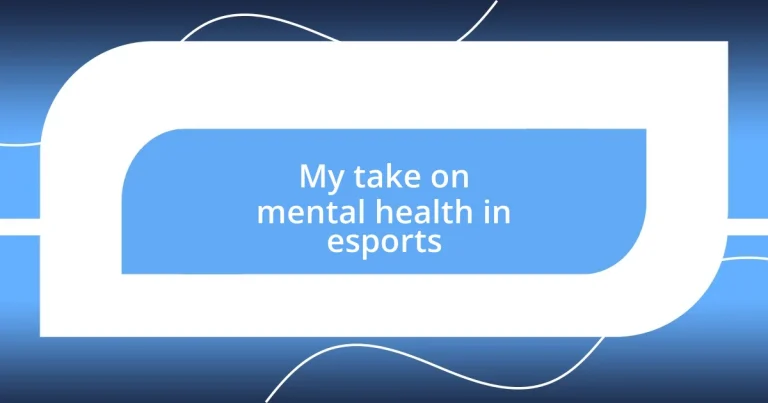Key takeaways:
- Mental health challenges in esports, such as anxiety and burnout, significantly affect player performance and well-being.
- Recognizing signs of mental distress, like withdrawal and changes in behavior, is crucial for initiating conversations about mental health.
- Building a support system and implementing healthy routines can enhance mental well-being and create a more positive gaming experience.
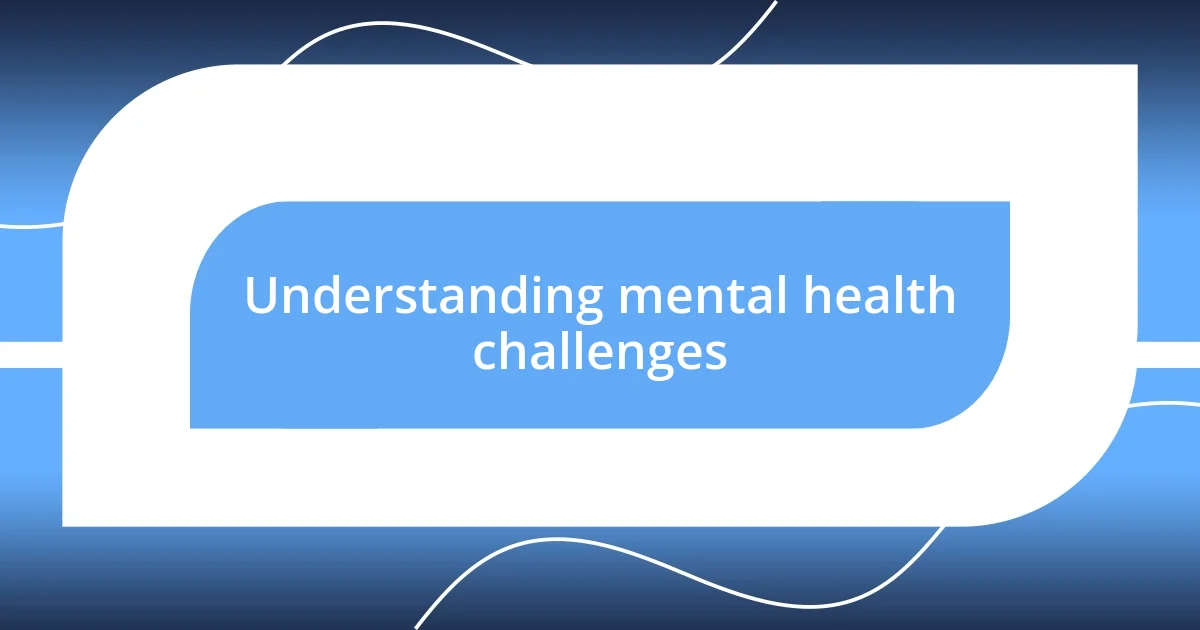
Understanding mental health challenges
When diving into mental health challenges in esports, it’s crucial to recognize the unique pressures players face. I remember watching a professional streamer, someone I admired, who openly shared his struggles with anxiety during critical matches. He asked his audience, “How can I perform my best when my mind is racing?” This question really made me reflect on how mental health can so profoundly affect performance.
The demanding schedules and constant scrutiny can lead to burnout, which I’ve seen firsthand in friends who’ve devoted every waking hour to training. It’s not just about physical skill; the mental toll can feel insurmountable. Have you ever felt the weight of expectations, wondering if you could ever live up to them? That pressure can cause not just stress, but a deep sense of isolation, making it harder to reach out for help.
Additionally, the culture around esports sometimes glamorizes the grind, dismissing the significance of mental well-being. I’ve spoken to gamers who felt they had to prioritize their game over their health—missing meals and sleep. Out of such experiences, I emerged with questions: What about the risk of losing oneself in the process? Isn’t it essential to find balance instead of sacrificing well-being for the sake of performance? The reality is, mental health shouldn’t just be an afterthought; it should be an integral part of every esports conversation.
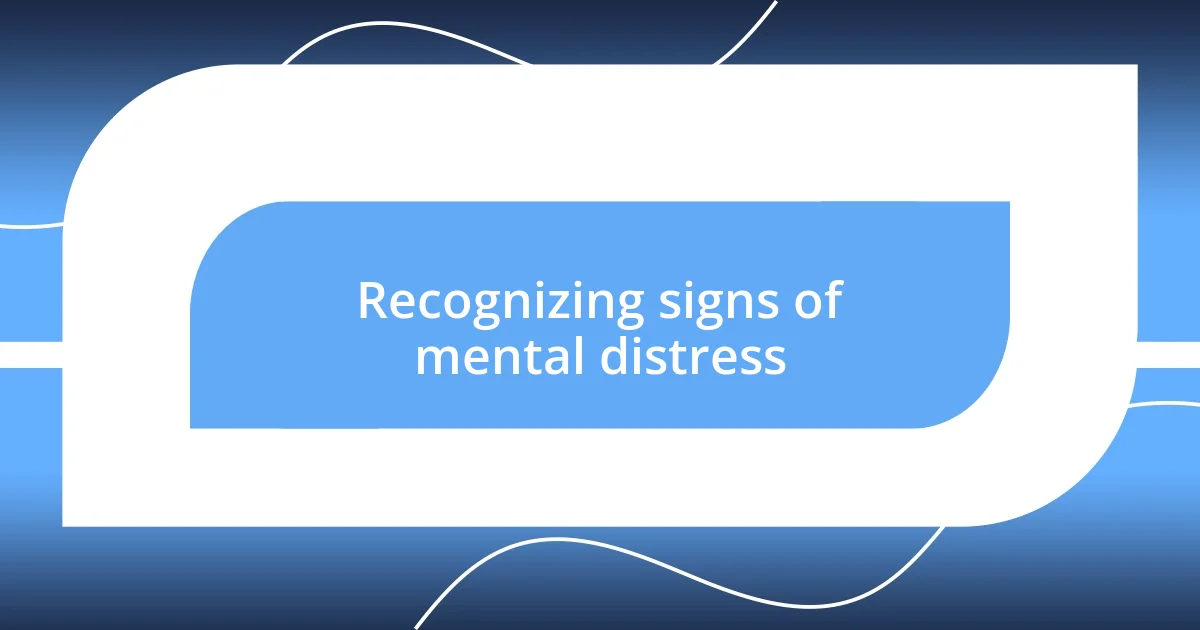
Recognizing signs of mental distress
Recognizing signs of mental distress in esports can be challenging, especially when the environment often masks these struggles. I’ve seen teammates who initially appeared focused but gradually became withdrawn during gaming sessions. This change made me more aware of how subtle changes in behavior can signal deeper issues. It’s essential to stay attuned to these shifts, both in oneself and in others.
Here are some common signs to watch for:
- Decreased performance or inconsistent gameplay
- Increased irritability or frustration during matches
- Avoidance of practice or gaming sessions
- Changes in sleep patterns—either insomnia or excessive sleeping
- Expressing feelings of hopelessness or worthlessness
- Withdrawal from team activities or social interaction
- Neglecting personal care or daily routines
I’ve been in situations where a friend’s decline in enthusiasm for the game was dismissed as just a slump. Looking back, those signs were clear indicators of the mental toll he was experiencing. Observing these changes can be the first step toward initiating meaningful conversations about mental health, which I believe is so critical in our community.
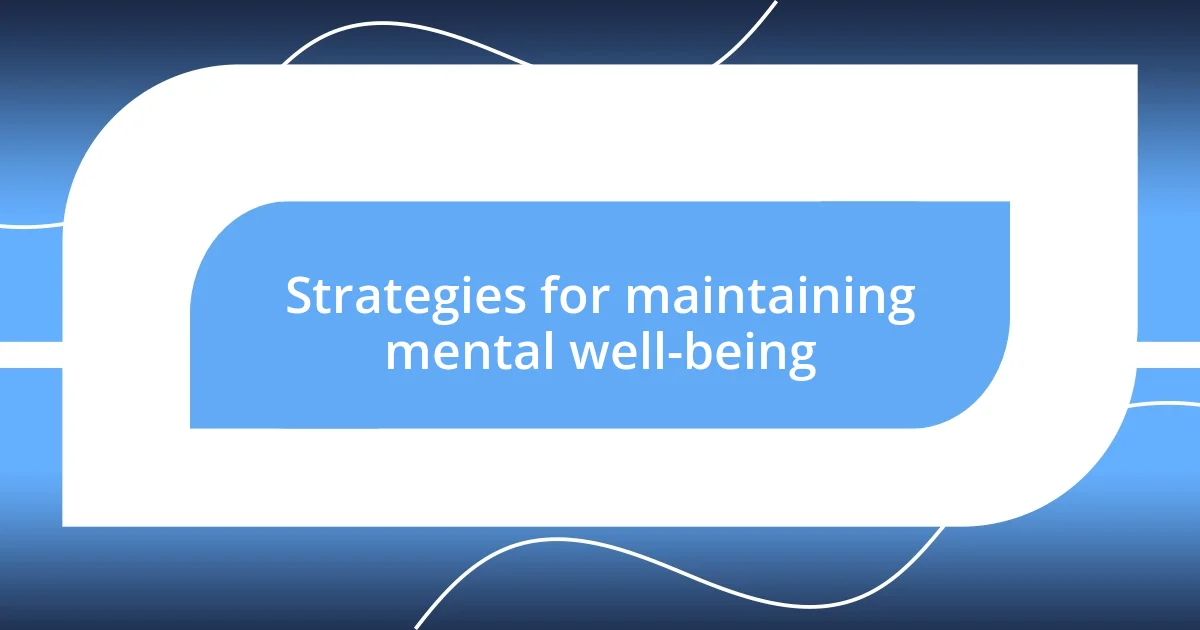
Strategies for maintaining mental well-being
To maintain mental well-being in esports, implementing healthy routines is essential. I recall a period when I dedicated my mornings to a mix of physical activity and mindfulness practices. It was refreshing to start my day with some exercise, followed by a few moments of meditation. This blend not only energized me but also provided clarity and focus, helping me tackle the day with a more positive mindset. I cannot stress enough how these small changes can create significant ripples in your mental health.
Social connections are another cornerstone in maintaining mental wellness. I learned this the hard way during a particularly intense competition season when I isolated myself to focus solely on my skills. It wasn’t until I re-engaged with friends and fellow gamers that I realized the importance of having that support system. Sharing experiences, both good and bad, can alleviate burdens and spark motivation. Have you ever felt the uplifting power of a simple chat after a tough loss? Those moments can turn feelings of loneliness into camaraderie.
Another key strategy lies in setting boundaries with gaming. I’ve found it necessary to schedule breaks, allowing myself time to recharge. I remember one weekend where I stepped away for a brief nature hike. When I returned, I noticed how much my perspective had shifted. This time away from screens was a reminder that there’s life outside of gaming. By prioritizing downtime, I discovered that performance improvement often comes from allowing ourselves the space to breathe and reflect.
| Strategy | Description |
|---|---|
| Healthy Routines | Incorporate physical activity and mindfulness to start the day positively. |
| Social Connections | Engage with friends and peers to foster support and share experiences. |
| Set Boundaries | Establish breaks from gaming to recharge and gain perspective. |
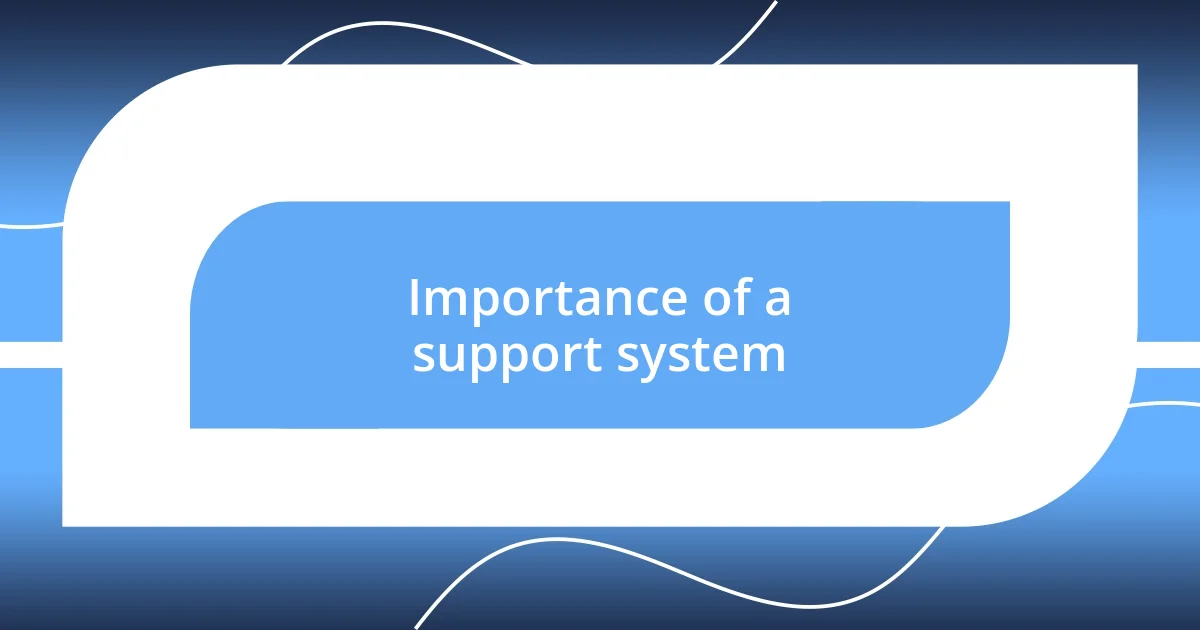
Importance of a support system
The significance of having a support system in esports cannot be overstated. For me, it was during an overwhelming tournament season that the impact of a solid network truly hit home. I remember feeling the weight of pressure building up, and it was my friends who reminded me to take a step back, breathe, and share my frustrations. Just a couple of honest conversations, filled with laughter and empathy, transformed my experience from isolating to invigorating.
Having people around you who genuinely understand the highs and lows of competitive gaming is invaluable. I often reflect on moments when I felt like giving up after a series of defeats. It was the encouragement from my teammates—simple phrases like, “We’ve got this, together”—that reignited my motivation. Isn’t it amazing how just a few supportive words can shift our mindset? It’s this collective energy that can make or break a player’s journey.
Support extends beyond mere words; it’s about active involvement. I recall a time when a fellow gamer organized a “mental health check-in” among our team members. It wasn’t about discussing strategies but about sharing personal struggles and celebrating wins, big or small. Those moments of vulnerability brought us closer. They served as a reminder that in esports, much like life, it’s okay to lean on one another. After all, isn’t that what being part of a team is truly about?












